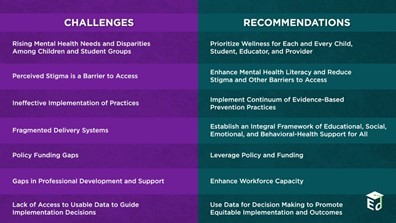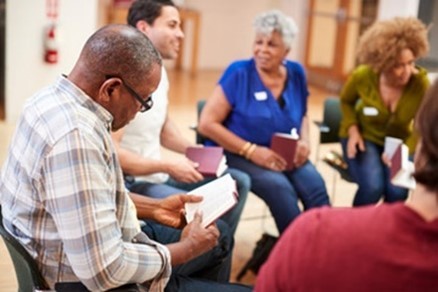Building the Black Male Educators Pipeline National Conference Presentation On Nov. 8, Initiative senior advisor Monique Toussaint spoke at the Building the Black Male Educators Pipeline National Conference, a virtual session hosted by Lincoln University, in collaboration with Claflin University, Grambling State University, Oakwood University, North Carolina Central University, and South Carolina State University. As a speaker on the panel “Federal, State and Local Policies — How to Support Building the Pipeline,” Toussaint highlighted the work of the Initiative to promote the necessity of teacher cultural competency and the diversification of the teacher workforce. This is achieved through programming like the AfAmEd Connector Roundtable, held in May 2021, titled “#BlackMenTeach,” along with the launch of an online campaign to highlight Black Male Teachers in June. The following conference speakers were also in attendance: - Christian Rhodes, chief of staff, Office of Elementary and Secondary Education, U.S. Dept. of Education
- Arthur P. McMahan, senior associate director, White House Initiative on Advancing Educational Equity, Excellence, and Economic Opportunity for HBCUs
- Representative Billy Mitchell, president, National Black Caucus of State Legislators
- Mayor Johnny Ford, founder, World Conference of Mayors, Inc.
#BlackMenTeach Nominations Still Open The Initiative launched the #BlackMenTeach social media campaign via the Department’s Twitter account. The campaign features Black male teachers nationwide to demonstrate that there are many Black males who are dedicated to serving their communities through teaching. Black male teachers represent just 2% of the teaching workforce. Despite being underrepresented, they play an important role in inspiring the next generation. The public can nominate a Black male educator to be considered for the campaign. More information can be found here. We look forward to rolling out the featured educators soon. To stay connected to the Initiative, please bookmark the updated link for our website and follow our updated handles on Twitter and Facebook. COVID-19 Information The Centers for Disease Control and Prevention (CDC) now officially recommends that children ages 5 through 11 be vaccinated against COVID-19 with the Pfizer-BioNtech pediatric vaccine. This recommendation comes after months of rigorous review and the Food and Drug Administration’s (FDA’s) decision to authorize emergency use of the vaccine for children. The COVID-19 vaccine is the best way to keep students safe and protect them against COVID-19, including the Delta variant. The pediatric vaccination program is now fully up and running, and there are approximately 20,000 trusted and convenient locations where families can go to get their children vaccinated, with more sites coming online in the weeks ahead. The departments of Education and Health and Human Services are helping schools and communities set up vaccine solutions that work best for families, including hosting thousands of school-located vaccine clinics; matching school districts with local pharmacy providers; and supporting collaboration between schools, families, and local pediatricians and children’s hospitals. A joint letter from Secretary Cardona and Secretary of Health and Human Services Xavier Becerra outlines three requests of school communities and shares information and resources to help fulfill them. (Note: First Lady Dr. Jill Biden recently visited a COVID-19 vaccination clinic at Franklin Sherman Elementary School in McLean, Virginia, which was the first school to administer the polio vaccine back in 1954.) The Department and CDC are also providing resources to states and schools for other mitigation efforts. A partnership among the two agencies and the Rockefeller Foundation aims to accelerate school-based screening testing for students and staff. This partnership is making staff available to state health departments to coordinate, execute, and expand school-based testing, contact tracing/case investigation, and other public health activities; publishing a start-up guide for schools on how to launch screening testing programs; holding weekly “office hours” to connect schools to national screen testing experts; launching a directory for schools to identify a provider and get started with testing; and releasing guidance for districts on using American Rescue Plan funds to provide incentives to parents and guardians to participate in screening testing programs. Meanwhile, the Department, in collaboration with CDC, launched a new COVID-19 data dashboard to help the public track the impact of COVID-19 on K–12 schools. The dashboard aggregates — in one location — data on pediatric cases, youth vaccination rates, and schools that are operating in-person, remotely, or a hybrid of the two. Data will be updated each week, and where possible, the information is presented geographically, so that educators and families can understand the impact of the virus in their communities. Furthermore, the Department of Labor’s Occupational Safety and Health Administration (OSHA) announced an emergency temporary standard to protect more than 84 million workers from the spread of COVID-19 on the job. Under this standard, covered employers must develop, implement, and enforce a mandatory vaccination policy or adopt a policy requiring employees to choose to either be vaccinated or undergo regular COVID-19 testing and wear a face covering at work. The standard covers employers with 100 or more employees — firm or company-wide — and provides options for compliance. (Note: Across the 26 states and two territories with OSHA State Plans, the standard will also cover public sector workers employed by state and local governments, including educators and school staff.) And, regarding implementing the President’s Executive Order on Ensuring Adequate COVID Safety Protocols for Federal Contractors, which ensures that parties that contract with the federal government — including many colleges and universities — provide COVID-19 safeguards to their workers, the Safer Federal Workforce Task Force site has been updated with a dedicated For Federal Contractors page. Finally, Secretary Cardona and U.S. Surgeon General Vivek Murthy penned a summative op-ed, calling for a renewed focus on children as the nation recovers from the pandemic. Public Service Loan Forgiveness Waiver If you qualify for Public Service Loan Forgiveness (PSLF) and have a Direct Loan, Federal Family Education Loan, or Perkins Loan, you can take advantage of an opportunity to get credit for prior payments that wouldn’t otherwise count toward PSLF: http://studentaid.gov/PSLFWaiver. Federal Borrower Update Secretary Cardona declared in a Tweet, “Our first batch of PSLF emails regarding loan forgiveness have all gone out to those with Direct Consolidation Loans and certified employment — check your inboxes! And if you didn’t get one, hang tight! More are on the way.” This action is in response to the overhaul of the PSLF Program that the Secretary announced in October (fact sheet). In a statement last month, Federal Student Aid (FSA) Chief Operating Officer Richard Cordray explained the Department’s approval of the request for Maximus to assume the Navient loan servicing contract. “We are confident this decision is in the best interest of the approximately 5.6 million federal student loan borrowers who will be serviced by Maximus and will provide the stability and high-quality service they deserve,” he stressed. “Our confidence in this novation is bolstered by the fact that Maximus will be held to the stronger standards for performance, transparency, and accountability that FSA included in its recent servicer contract extensions.” FSA, Navient, and Maximus will reach out directly with borrowers about how this change affects them. Cordray also testified before the House Subcommittee on Higher Education and Workforce Investment on his office’s key priorities, including restarting federal student loan repayments in February 2022 (video). Office for Civil Rights Releases Fact Sheet on Supporting Intersex Students On Oct. 26, in recognition of Intersex Awareness Day, the Department’s Office for Civil Rights (OCR) issued a fact sheet, “Supporting Intersex Students: A Resource for Students, Families, and Educators.” Federal civil rights laws protect all students, including intersex students, from sex discrimination. OCR recognizes that intersex students may face challenges to fully and equally participating in school. The fact sheet lists key issues intersex students face in schools, including bullying, harassment, or other discrimination related to their physical characteristics or because they do not conform to sex stereotypes.  New Mental Health Resource On Oct. 19, the Department released a new resource to enhance the promotion of mental health and social and emotional well-being among children and students. Supporting Child and Student Social, Emotional, Behavioral, and Mental Health highlights seven challenges to providing school- or program-based mental health support across early childhood, K–12, and higher education settings and presents seven corresponding recommendations. This resource includes a number of real-world examples of how the recommendations are being put into action by schools, communities, and states across the country (White House fact sheet and Twitter thread). “Our efforts as educators must go beyond literacy, math, history, science, and other core subjects to include helping students to build the social, emotional, and behavioral skills they will need to fully access and participate in learning and make the most of their potential and future opportunities,” Secretary Cardona said. Pathways to the C-Suite Internship Program The Congressional Black Caucus Foundation (CBCF) is proud to announce the new spring 2022 Pathways to C-Suite Internship Program presented by the U.S. Cannabis Council. This unique internship experience partners African American college seniors and one-year post-bachelor’s degree graduates with some of the nation’s top executives in the private sector to experience how public policy is influenced and developed at every level of the process. Benefits of this program include: - Housing
- A Stipend
- Professional Development Courses
- Networking Opportunities
CBCF will offer the following two information sessions to allow prospective applicants to learn more about the internship program: Apply today. Undergraduate Fellowship Program The Center for Retirement Research at Boston College is sponsoring a new summer research program for undergraduates of various disciplines. Undergraduate fellowships are full-time paid summer research assistantships that combine hands-on research experience with one-on-one mentoring. - The program aims to help spark interest in the field of retirement income security and build career pathways for students.
- Historically underserved or underrepresented individuals are strongly encouraged to apply.
- Up to four fellowships will be awarded and housing will be available at no cost.
The Undergraduate Fellowship Program is funded by the U.S. Social Security Administration. The application deadline is Jan. 31, 2022.  U.S. Department of Energy’s Mickey Leland Energy Fellowship The U.S. Department of Energy's (DOE’s) Mickey Leland Energy Fellowship (MLEF) Program is currently accepting applications for their summer 2022 program. This 10-week summer research fellowship is for undergraduate and graduate students in STEM majors seeking to gain experience in energy research. Participants complete a cutting-edge research project at one of DOE's national laboratories or at DOE headquarters, under the mentorship of our scientists and engineers. Participants receive a stipend, and travel and housing assistance. Audience: Undergraduate and graduate students who are U.S. citizens. Application Deadline: Jan. 10, 2022. Contact: mlef@hq.doe.gov |
 The Entertainment Law & Policy Fellowship The Entertainment Law & Policy Fellowship is the result of a partnership between the Motion Picture Association (MPA) and the Entertainment Industry College Outreach Program (EICOP). It is the first of its kind to serve recent graduates from historically Black colleges and universities (HBCUs), Hispanic-serving institutions and other minority-serving institutions. This prestigious program eliminates systemic barriers to entry by providing selected fellows with housing, travel, and pay stipends to participate in the year-long program. Fellows will gain relevant work experience working with MPA member studios and interacting with senior-level industry executives and policy makers while building the skills needed to prepare them for careers as future law and policy leaders. This pipeline solution program is designed to equip a talent pool that is ready-for-hire in today’s global creative workforce. Fellows will join EICOP’s thriving HBCU in L.A. alumni network upon completion of the program to ensure they have the support and resources needed to successfully navigate their professional career goals. All applicants must have a demonstrated interested and focus in entertainment law and/or policy. The program will take place between Washington, D.C., and Los Angeles. Apply today! |
 |
The Big Read The National Endowment for the Arts’ (NEA’s) The Big Read, established in 2016, supports programs that encourage Americans to read and discuss a single book within their communities. Local governments, libraries, school districts, colleges and universities, and nonprofit organizations are encouraged to apply for one of approximately 75 grants that will be awarded for programming occurring between Sept. 2022 and June 2023. Besides the grant, communities will receive resources, including reader’s guides, teacher’s guides, and audio guides featuring commentary from artists, educators, and public figures. Communities also will receive publicity materials. The application deadline is Jan. 26, 2022. Need help? Contact Arts Midwest to schedule a consultation with staff, visit the Application Advice page for tips and best practices for applications, and review the NEA Big Read Survival Guide to glean wisdom from past grantees. To date, approximately 1,700 Big Read programs have taken place nationwide.  Introducing Communities Local Energy Action Program Last month, DOE Secretary Jennifer Granholm introduced Communities Local Energy Action Program (LEAP) — a new pilot initiative to support communities currently experiencing either direct environmental justice impacts or direct economic impacts from a shift away from historical reliance on fossil fuels. Under this pilot initiative, DOE will provide technical assistance services, valued at up to a total of $16 million, to support 24 to 36 communities in developing their own community-driven clean energy transition approaches. - Register and apply. Applicants must register to apply for this opportunity. Once registered, applicants will receive access to apply. The application deadline is Dec. 17, 2021, at 5 p.m. ET.
- Application questions. Application questions, eligibility guidelines and other need-to-know information can be found in the Opportunity Announcement. DOE issued a final Opportunity Announcement on Oct. 25.
- Stay up to date. Sign up for Communities LEAP updates on the website.
Questions. Communities LEAP staff is hosting an “office-hour” style webinar on Tuesday, Dec. 7, 3:30 p.m.–5 p.m. EST, for prospective applicants to ask questions as they prepare to apply. Register now at the link. Questions will also be answered by emailing CommunitiesLEAPInfo@hq.doe.gov. |
|
Comments